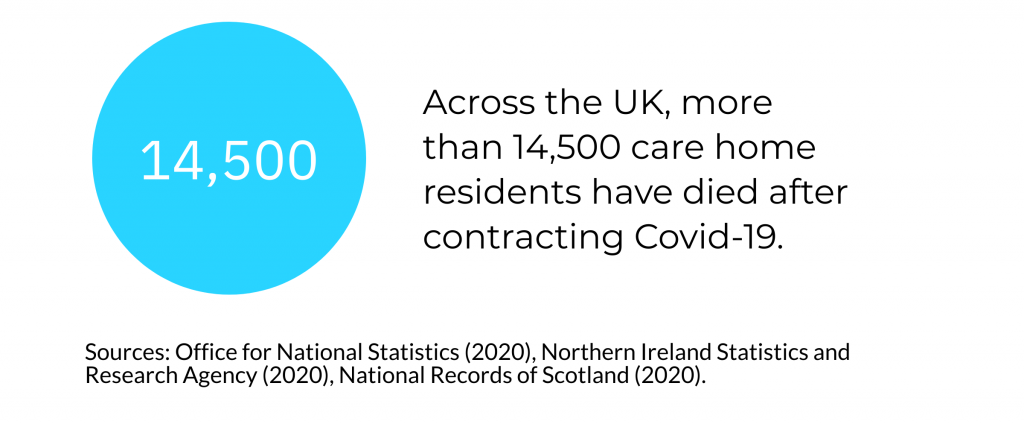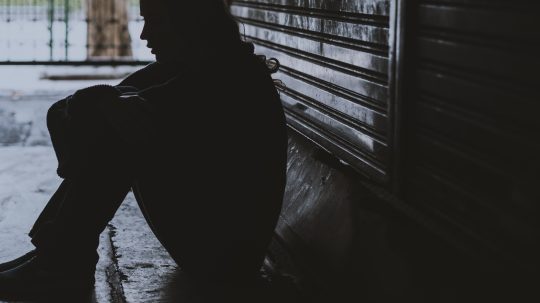On the morning of 5 May, John Gordon video called his 83-year-old father, who had contracted coronavirus, for the last time before he passed away hours later in a care home on the Isle of Skye.
The coronavirus lockdown meant Gordon and his sister were not allowed to visit their father in person, so instead they had to call him on FaceTime. Gordon, 49, recalls the clinical setting: his father lying on a bed surrounded by carers in personal protective equipment (PPE), having only tested positive for the virus three days earlier. “On the last day of his life, the hand he was reaching out for was a carer’s – who was very caring and loving and we’re not faulting her – but we’re living in a [world] where she had to have blue gloves on,” he explains. “It just broke our hearts, thinking, that should have been our hands”.
Speaking over the phone, Gordon remembers his father, also called John, as “quite a quiet, humble man”, but one who was “always warm and welcoming”, and whose “smile would say a million words”. When his father’s dementia worsened four years ago, Gordon and his sister placed him in nearby Home Farm, in the coastal town of Portree, which was less than a ten minute drive away from each of their homes. There, Gordon says his father was “very content”, becoming an active member of the community, where he would walk around the corridors and help out with the tea trolley.
But an outbreak of Covid-19 at Home Farm has devastated the close-knit local community. Alongside John, at least nine others have died there after contracting Covid-19 – one quarter of the home’s lodgers. The tragedy at Home Farm is emblematic of the crisis engulfing care homes across the UK. Despite the overall death toll falling, the proportion of coronavirus-related fatalities in care homes is still rising compared with the rest of the population.

As of 3 June, nearly half (46%) of all coronavirus-related deaths in Scotland have been in care homes. The Scottish health secretary, Jeane Freeman, has called for a review into the care home sector. In Northern Ireland, more than half (53.1%) of the 716 coronavirus-related deaths recorded were care home residents, and in England and Wales, nearly a third (32.5%) of all care home residents’ deaths were Covid-19-related in the week ending 22 May. Collectively, more than 14,500 care home residents are estimated to have died after contracting Covid-19 in England, Wales, Scotland and Northern Ireland. The number of deaths of residents with learning disabilities in England’s care homes between 10 April to 15 May this year, at 386, is more than double the number in the same period last year, according to data from the Care Quality Commission.
What happened in the UK’s care homes?
Who is responsible for ensuring that care home residents and staff are tested for Covid-19? The reality is complicated, which is perhaps part of the problem. Under the system of devolution, each nation of the UK is responsible for its own healthcare system and makes decisions independently. But, in April, the UK government said NHS England would take the lead on procuring and distributing testing kits after it emerged NHS boards across the country were competing against each other to buy equipment.
Within England at least, different officials and agencies have reportedly “passed the buck” over who is responsible for carrying out the tests in care homes. Initially the UK government said the care home regulator the Care Quality Commission (CQC) was “leading co-ordination of testing for the care sector”. On 7 May, it reportedly passed this duty on to Public Health England (PHE), an independent agency of the Department of Health which is responsible for dealing with communicable disease outbreaks, although some local public health directors were not informed until several days later. Care home managers seeking to get hold of testing kits were reportedly sent back and forth between the CQC and PHE.
Criticism has been levelled at each of the UK’s devolved administrations for their various roles in the care homes crisis, including:
- In Scotland, one chairperson of a care home group said the Scottish government of had “betrayed” private care homes, accusing it of presiding over three months of “mixed messages, mismanagement and missed opportunities”.
- In England, the chief executive of Care England said that the testing figures are “very disappointing”.
- In Wales, the Older People’s Commissioner has called for the Equality and Human Rights Commission (EHRC) to scrutinise the Welsh government’s actions over the “tragedy” unfolding in care homes, raising concerns that “older people’s rights may not have been sufficiently protected”.
- In Northern Ireland, the Commissioner for Older People said he was “deeply concerned” following 11 deaths in a north Belfast care home, having previously raised human rights concerns.
At a UK-wide level, the EHRC has said it is “deeply concerned about serious potential breaches of older people’s human rights” during the pandemic, highlighting the “discharge of Covid-19-positive older people from hospital into care homes”; “inappropriate blanket healthcare decisions” on Do Not Attempt Resuscitation notices; and the “lack of sufficient PPE”. Last month, the National Care Forum said testing arrangements across the UK “remain chaotic”. Under UK government guidance, hospitals were allowed to discharge asymptomatic patients into care homes without testing to free-up beds.
Gordon believes the rights of his father and other residents were violated at Home Farm. “I certainly feel that the residents’ human rights were breached because they were not protected,” he says. “The most vulnerable in our society were not shielded and protected.” He blames the home’s management, alongside the UK government, and says that the systematic testing of staff and residents at the home was brought in “far too late”. However, Gordon praises the carers at Home Farm, adding: “From my perspective, the carers were very loving and, and they couldn’t have been more connected to us that last day”.
Governments across the UK have been criticised by those in the care sector over their varying guidelines for testing in care homes. In Scotland, residents and staff are tested if there is one confirmed case, or if another home belonging to the same chain has had an outbreak, and there is also sample testing in some homes without cases. As the coronavirus pandemic began to sweep through England’s care homes, testing was initially only provided to the first five residents displaying symptoms in each care home.
In England, from 28 April, the government announced that any care home staff or residents can request testing kits – however, there have been complaints that this process has been delayed. In a strongly worded press release the director of care home provider Accurocare said, that notwithstanding the government’s promise, “there was no access to such tests and despite government briefings nothing followed” until 12 May, when he was finally able to request testing kits.
Like most families with loved ones at Home Farm, Gordon only found out that there might be an outbreak on 27 April, when the mother of one of the carers posted on Facebook saying her son had tested positive. However, EachOther understands that Home Farm was unable to inform residents until this carer had disclosed his test results to the company, which was after he had told his mother, due to patient confidentiality rules. Gordon says that, after calling the home, he was was given “no information” from the management, and it was several days before he was told that all staff and residents would be tested. “I feel personally that our old people and my dad have been let down by the government as a result of the lack of testing,” he adds.

John Gordon (left) with his father. Credit: Courtesy of John Gordon
Legal expert John Williams, a professor in the department of law and criminology at Aberystwyth University, says that “there is most certainly a case to answer” regarding whether UK care home residents’ rights have been violated. “It can be summed up quite simply, actually: the state has a duty to protect the life, particularly of vulnerable people, if it’s aware life is in danger and [if] it’s a state activity, which this is,” says Williams. “Health and social care are state activities.” Williams, who has worked with The Older People’s Commissioner for Wales, says that he finds the whole situation “pretty appalling”.
A spokesperson for Home Farm, which is owned by the UK’s largest care home chain HC-One, said: “Throughout the UK’s coronavirus outbreak, we have worked closely with our local health and care partners, and have taken action to secure the medical equipment, PPE, and supplies we need to protect residents and colleagues across all our homes.” They also said the home is progressing with its “robust action plan” in partnership with NHS Highland, and that it is “continuing to make sustained and continued improvements across the home so we can deliver the very best for residents and colleagues at Home Farm”.
In the care home sector, some staff, residents and their families appear to be afraid to speak for fear of repercussions from providers. One man, who did not wish to be identified, told EachOther that his mother passed away after contracting Covid-19 in an Oldham care home where no testing was carried out. He added that his mother only discovered she was positive at hospital before accusing the government of treating care home residents as “second class citizens”. He said: “These people were expendable, they weren’t a priority at all, and that’s my mother.” EachOther has also seen a letter sent to charity Age UK last month by a 75-year-old man living in a Surrey care home, who said that management had ordered 98 testing kits but that these still hadn’t arrived nearly two weeks later.

Home Farm is situated in the coastal town of Portree, Skye. Credit: Reading Tom / Flickr
Charities representing the care home sector have also criticised the government over inadequate testing in care homes. Martin Green, chief executive of Care England, says that the testing figures are “very disappointing”, adding that there is “once again a mismatch in announcement from the government and delivery on the ground”. He continues: “The sector doesn’t just need testing, but rolling testing in order that residents and staff can be checked frequently and routinely to guard against this pandemic.” Fiona Carragher, director of research and influencing for the Alzheimer’s Society also shared her worries, saying that the charity has been “concerned from the beginning of the pandemic about adequate testing, especially for those discharged from hospital”. Around 70% of care home residents in the UK are diagnosed with some form of dementia, like Gordon’s father.
‘The care home sector needs rolling testing’

Gordon says it has been “hard” without his father. Credit: Courtesy of John Gordon
Karolina Gerlich, executive director of The Care Workers Charity, which supports current and former care workers with one-off financial crisis grants, says that there have “definitely” been major issues regarding inadequate testing across the UK. “The information that we’ve been getting from the start of the crisis is that testing wasn’t available to social care,” she explains. “The NHS was prioritised with everything – PPE, testing, volunteers – above social care. There was a lack of realisation that the two have to work together.” Gerlich adds that care homes were “recognised as places where [they] can make sacrifices because of the virus”.
‘Grieving has been quite a hard process’
For Gordon, it has been difficult to process the loss of his father, particularly because he lives alone and coronavirus restrictions limited the number of people at his father’s funeral. “It is hard, there are so many aspects that are hard, not being with him,” he explains. “It’s just not that same connection that you have with your family or friends, so grieving has been quite a hard process to be honest.” Still, he remains resolute in his viewpoint: his father was not protected by the government and its policies for the care home sector. “Residents at Home Farm did not get Covid-19 just because we’re living in a worldwide pandemic; they got it because of the lack of proper procedures and policy, the lack of testing, the lack of leadership, which is a breach of their human rights,” he says.
What does the Scottish government say?
“Our priority since the start of this pandemic has been to save lives in whatever setting, including care homes,” said a Scottish government spokesperson.
“The Scottish government has from the outset taken firm action to protect care home staff and residents. In early March we issued clinical and practice guidance for care homes. That guidance was updated on 26 March, and again on 15 May.
“On 1 May, the First Minister announced enhanced outbreak investigations in care homes and on 17 May the Health Secretary introduced enhanced clinical and professional oversight for all care homes.
“A large proportion of those in care homes will have been diagnosed as lacking capacity. Any decisions taken in respect of these persons must respect the human rights based principles of the Adults with Incapacity (Scotland) Act 2000 and the United Nations Convention on the Rights of Persons with Disability.

Nicola Sturgeon, first minister of Scotland. Credit: Wikimedia Commons
“The Scottish government is committed to implementing these principles. This means that any decision taken in respect of the person must be for the benefit of the person, the views of all interested parties, including the person themselves should be taken account of, it must be the method of least intervention and the person must be encouraged to exercise existing skills and learn new ones. The rights, will and preference of the person should be first and foremost.
“We have taken a number of other steps such as supporting care homes’ usual supply routes for PPE with additional national routes – a dedicated helpline, local social care PPE hubs, and a direct delivery of PPE to all care homes in Scotland; increased testing; and emergency legislation to ensure continuity of care.
“Any person who has Covid – whether they are in a care home or their own home – should be treated as an individual. It is essential that human rights continue to be fully respected, protected and fulfilled throughout the current emergency. The human rights aspects of everything that we are doing right now are absolutely core to all our considerations. All our decisions on the Covid-19 response have been guided by the scientific advice available at the time and we continue to tailor that response as more is learned about the virus.”
What does the UK government say?
A Department of Health and Social Care spokesman said: “We are working tirelessly with care homes to reduce transmission and save lives in this unprecedented global pandemic.
“Our support for care homes – including financial support, infection control training, and supplies of PPE – has helped two thirds of England’s care homes to prevent having any outbreak at all.
“Any decisions about the needs of care home residents must consider individual circumstances and ethical implications, to ensure that at all times they are treated with respect and their human rights, personal choices, safety and dignity are upheld.”





